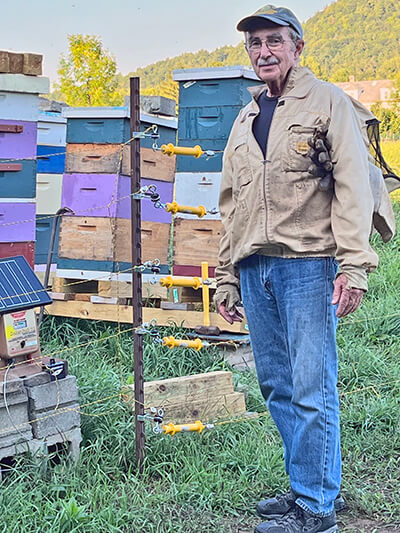Hanging out with the bees and keeping them happy
Bob Haven spent most of his professional life in technology but when that career ended, he looked for another way to use his problem-solving skills. The result was Safe Haven Honey, a business that keeps his mind sharp while providing sweet sustenance for himself and others.
Haven launched the business 12 years ago when he purchased his first bees. He currently has 12 hives, the largest of which has over 100,000 bees. His wife Connie helps with the financial end of the business and some of the marketing, but Haven said she’s not overly comfortable around the apiary.
Beekeeping has a variety of challenges, but for Haven the biggest problem is the mites. “You have to evaluate the hives every four weeks or so,” he said. “Four days after the queen lays an egg it becomes larva and that’s when the mite attaches itself.”
Checking to see if there are mites is a process which requires the bees to be taken out of the hive, but Haven stresses that they are not injured during the testing. The bees can only be removed when the queen isn’t present, and testing should only be done if there is exposed larva. Haven shakes a few bees into a jar with a mesh cover and puts in a few spoonfuls of powdered sugar. He rolls the jar gently for a minute and lets it sit for another minute. The sugar is emptied into a pan and spritzed with water while the bees are returned to the hive. If there are more than three red dots, the hive has to be treated for mites.

Raising bees also means contending with issues much larger than mites. For several years, one or more bears pushed over some hives but didn’t cause much damage. This spring, however, a bear was significantly more destructive, leading Haven to install an electric fence which required moving the bees. “A hive can weigh more than 160 pounds,” Haven said, adding that the weight is the least of the problems.
“Bees don’t like too much attention,” he said, “and in their own way, they’ll let you know.”
“Bees have locked in their GPS on their current location,” Haven explained, “so you shouldn’t move the hive more than 3 feet every two or three days.”
Unfortunately, the bear threat was strong enough that in addition to the incremental moves while installing the fence, he temporarily moved half the hives to Williston.
Haven started his career in the manufacturing realm and then switched to becoming a manufacturing engineer and then a principal network engineer. He wrote manuals and helped set up training programs. Haven enjoyed the work but found it challenging to keep up with the technology while helping his wife raise their two children.
“I got up one morning,” he said, “and I told Connie I had to have bees.”
Haven said that there are roughly six different breeds of queens, and each has a different temperament. There is generally only one queen to each hive and her disposition is crucial to the wellbeing of the bees, as well as the beekeeper. He has been getting Sakatraz bees from a breeder friend in Iowa.
“Last summer I could go to my hives and spend time there without my suit and headgear because the queen was so calm,” Haven said. “I could even pull out a frame or two without getting them upset, but this year as soon as I get to the apiary, the Wicked Witch of the West gets upset, and I can’t even get under the electric fence in my suit before they’re looking for a place to sting me.”
Most of Haven’s sales are by word of mouth and he has many repeat customers who get discounts when they bring back the glass jars. He also sells to Philo Ridge Farm and Foam Brewery. In addition to honey, he markets what are basically beekeeper starter kits called nucleus colonies which he also uses to replenish his hives after winter die-offs.
“I think part of the reason I became a beekeeper is it keeps my mind going with problem solving,” Haven said. “You have to do inspections every couple of weeks and do tests and evaluate the progress.”
Haven has set up an old table and chair so he can watch the hives with a cup of tea or a cold brew in the summer. “I still enjoy watching the bees,” he said. “I still go up there and just hang out with them.”

